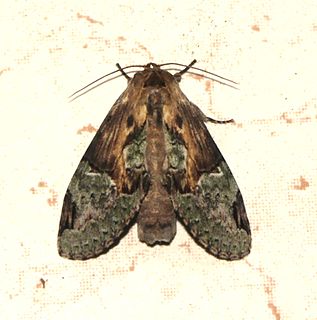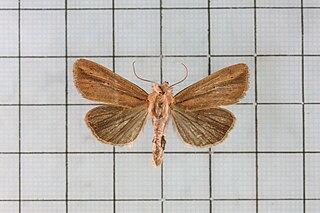
Aporandria is a monotypic moth genus in the family Geometridae described by Warren in 1894. Its single species, Aporandria specularia, was first described by Achille Guenée in 1857. It is found in Sri Lanka, India, Vietnam, Thailand, the Andamans, Peninsular Malaysia, Sumatra, Borneo, the Philippines and Sulawesi.

Hulodes caranea is a species of moth of the family Erebidae first described by Pieter Cramer in 1780. It is found from India, Sri Lanka, Myanmar, Java, Hong Kong to Queensland and New Guinea, it is also found on the Marianas and Carolines.

Mythimna decisissima is a moth of the family Noctuidae first described by Francis Walker in 1856. It is found from India across south-east Asia including Hong Kong, Japan, Taiwan and Australia in Queensland and New South Wales. It is also present in South Africa.

Thyas coronata is a species of moth of the family Erebidae first described by Johan Christian Fabricius in 1775. It is found from the Indo-Australian tropics of southern China, Taiwan, Japan, Nepal, India, Sri Lanka to Micronesia and the Society Islands.

Chadisra bipars is a moth of the family Notodontidae. It was described by Francis Walker in 1862 and is found in the Indomalayan realm.

Sympis rufibasis is a moth of the family Noctuidae first described by Achille Guenée in 1852. It is found from the Indo-Australian tropics of India, Sri Lanka, Borneo east to New Guinea, the Solomons and Queensland.

Ischyja manlia is a species of moth of the family Noctuidae first described by Pieter Cramer in 1776. It is found in the Indian subregion, Sri Lanka, Myanmar, Thailand, China, Okinawa, Sundaland, Sulawesi, Korea, the southern Moluccas, Australia (Queensland) and Palau. Adults pierce the skin of fruit to suck the juice.

Ramadasa pavo is a moth of the family Noctuidae first described by Francis Walker in 1856. It is found in south-east Asia. including Sumatra, Borneo, Sabah, Sulawesi, Thailand, Sri Lanka, India and China.

Mythimna pallidicosta is a moth in the family Noctuidae first described by George Hampson in 1894. It is found from north-eastern India to western China, Sri Lanka, Taiwan, Sundaland, Flores, the Philippines and Japan.
Schrankia croceipicta is a species of moth of the family Erebidae. It was first described by George Hampson in 1893. It is found in Sri Lanka and the Seychelles.

Autoba abrupta is a species of moth of the family Erebidae. It is found in Papua New Guinea, Thailand, and Australia. The species is largely used by the name Eublemma abrupta in Indian and Sri Lankan texts.
Calamotropha anticella is a moth in the family Crambidae. It was described by Francis Walker in 1866. It is found in South Africa and Sri Lanka.
Charltoniada apicella is a moth in the family Crambidae. It was described by George Hampson in 1896. It is found in India and Sri Lanka.
Roxita adspersella is a moth in the family Crambidae. It was described by Pieter Cornelius Tobias Snellen in 1893. It is found in Sri Lanka.
Chilo ceylonica is a moth in the family Crambidae. It was described by George Hampson in 1896. It is found in Sri Lanka, Vietnam and Hainan, China.
Mesolia pandavella is a moth in the family Crambidae. It was described by Émile Louis Ragonot in 1889. It is found in India and Sri Lanka.
Ptychopseustis fuscivenalis is a moth in the family Crambidae. It is found in Sri Lanka.
Patissa lactealis is a moth in the family Crambidae. It was described by Cajetan Felder, Rudolf Felder and Alois Friedrich Rogenhofer in 1875. It is found in Sri Lanka.
Sufetula polystrialis is a moth in the family Crambidae. It was described by George Hampson in 1912. It is found on the Louisiade Islands.
Sthenistis is a monotypic moth genus in the family Immidae. Its only species, Sthenistis gyrtoniformis, is found in Sri Lanka. Both the genus and species were described by George Hampson in 1896.








